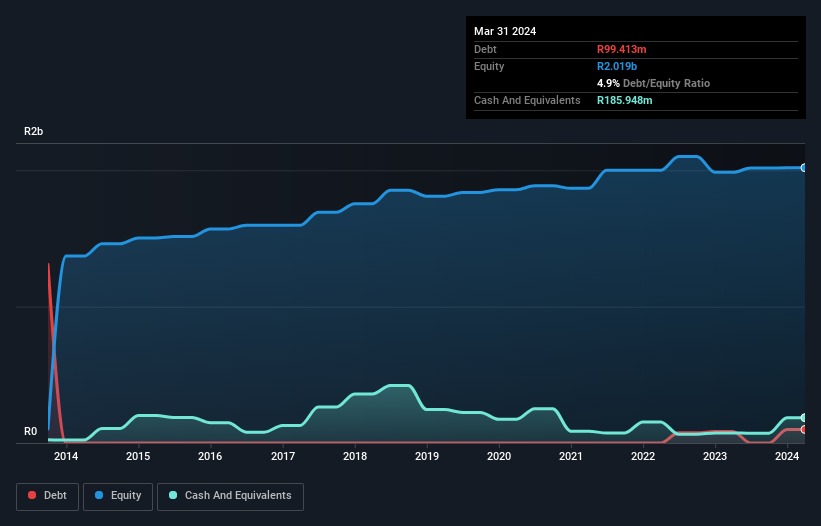
Howard Marks put it nicely when he said that, rather than worrying about share price volatility, 'The possibility of permanent loss is the risk I worry about... and every practical investor I know worries about.' So it might be obvious that you need to consider debt, when you think about how risky any given stock is, because too much debt can sink a company. We note that Quantum Foods Holdings Ltd (JSE:QFH) does have debt on its balance sheet. But is this debt a concern to shareholders?
When Is Debt A Problem?
Debt and other liabilities become risky for a business when it cannot easily fulfill those obligations, either with free cash flow or by raising capital at an attractive price. In the worst case scenario, a company can go bankrupt if it cannot pay its creditors. However, a more frequent (but still costly) occurrence is where a company must issue shares at bargain-basement prices, permanently diluting shareholders, just to shore up its balance sheet. Having said that, the most common situation is where a company manages its debt reasonably well - and to its own advantage. When we examine debt levels, we first consider both cash and debt levels, together.
Check out our latest analysis for Quantum Foods Holdings
How Much Debt Does Quantum Foods Holdings Carry?
As you can see below, at the end of March 2024, Quantum Foods Holdings had R99.4m of debt, up from R84.2m a year ago. Click the image for more detail. But it also has R185.9m in cash to offset that, meaning it has R86.5m net cash.

How Strong Is Quantum Foods Holdings' Balance Sheet?
Zooming in on the latest balance sheet data, we can see that Quantum Foods Holdings had liabilities of R608.6m due within 12 months and liabilities of R369.3m due beyond that. Offsetting this, it had R185.9m in cash and R633.2m in receivables that were due within 12 months. So it has liabilities totalling R158.8m more than its cash and near-term receivables, combined.
Since publicly traded Quantum Foods Holdings shares are worth a total of R2.62b, it seems unlikely that this level of liabilities would be a major threat. Having said that, it's clear that we should continue to monitor its balance sheet, lest it change for the worse. While it does have liabilities worth noting, Quantum Foods Holdings also has more cash than debt, so we're pretty confident it can manage its debt safely.
Notably, Quantum Foods Holdings made a loss at the EBIT level, last year, but improved that to positive EBIT of R13m in the last twelve months. There's no doubt that we learn most about debt from the balance sheet. But you can't view debt in total isolation; since Quantum Foods Holdings will need earnings to service that debt. So when considering debt, it's definitely worth looking at the earnings trend. Click here for an interactive snapshot.
Finally, while the tax-man may adore accounting profits, lenders only accept cold hard cash. Quantum Foods Holdings may have net cash on the balance sheet, but it is still interesting to look at how well the business converts its earnings before interest and tax (EBIT) to free cash flow, because that will influence both its need for, and its capacity to manage debt. Happily for any shareholders, Quantum Foods Holdings actually produced more free cash flow than EBIT over the last year. There's nothing better than incoming cash when it comes to staying in your lenders' good graces.
Summing Up
While it is always sensible to look at a company's total liabilities, it is very reassuring that Quantum Foods Holdings has R86.5m in net cash. The cherry on top was that in converted 1,042% of that EBIT to free cash flow, bringing in R133m. So we are not troubled with Quantum Foods Holdings's debt use. There's no doubt that we learn most about debt from the balance sheet. But ultimately, every company can contain risks that exist outside of the balance sheet. For example, we've discovered 3 warning signs for Quantum Foods Holdings (2 can't be ignored!) that you should be aware of before investing here.
At the end of the day, it's often better to focus on companies that are free from net debt. You can access our special list of such companies (all with a track record of profit growth). It's free.
Valuation is complex, but we're here to simplify it.
Discover if Quantum Foods Holdings might be undervalued or overvalued with our detailed analysis, featuring fair value estimates, potential risks, dividends, insider trades, and its financial condition.
Access Free AnalysisHave feedback on this article? Concerned about the content? Get in touch with us directly. Alternatively, email editorial-team (at) simplywallst.com.
This article by Simply Wall St is general in nature. We provide commentary based on historical data and analyst forecasts only using an unbiased methodology and our articles are not intended to be financial advice. It does not constitute a recommendation to buy or sell any stock, and does not take account of your objectives, or your financial situation. We aim to bring you long-term focused analysis driven by fundamental data. Note that our analysis may not factor in the latest price-sensitive company announcements or qualitative material. Simply Wall St has no position in any stocks mentioned.
Have feedback on this article? Concerned about the content? Get in touch with us directly. Alternatively, email editorial-team@simplywallst.com
About JSE:QFH
Quantum Foods Holdings
Engages in the feed and poultry business in South African and other African markets.
Excellent balance sheet slight.
Market Insights
Community Narratives



